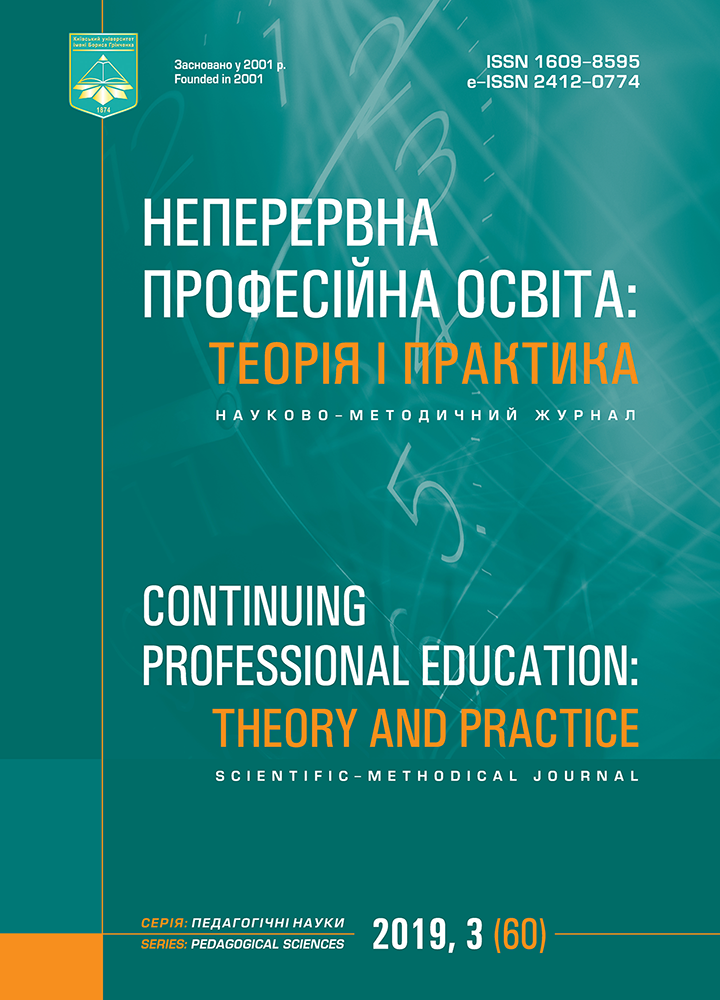TECHNOLOGY «BOOK TALK» IN THE WORK OF A PRIMARY TEACHER IN CANADA AND UKRAINE
DOI:
https://doi.org/10.28925/1609-8595.2019.3.7681Keywords:
criteria, educational process, educational technologies, general educational institutions, motivation, readers’ skills.Abstract
Under the conditions of the development of the New Ukrainian School, there is a borrowing of international educational experience, which is conditioned by the introduction of high-quality world practices, technologies into the educational process. The article describes the features of the formation and development of «Book Talk» technology for the development of readers’ skills and motivation of elementary school students to read. The possibilities of implementation of effective educational technology in general educational institutions of Ukraine are substantiated. The attention is paid to the history of the development of this technology and its implementation in educational and public cultural institutions (libraries, reading centers, book clubs). The need to explore the technology of «Book Talk» is necessary in order to attract students to reading fiction, analysis of artistic works, conducting discussions, peer interest in reading the book. After all, in the context of the rapid development of the world, one of the main tasks of the New Ukrainian School is the maximum interest of students in the book, making it competitive with the digital world (television, the Internet).
References
Chambers, A. (1985). Booktalk: occasional writing on literature and children. London, UK: Bodley Head (eng).
Cleaver, S. (2018). What Is a Book Talk? Your Guide to Making Them Work in the Classroom. Retrieved from https:// www.weareteachers.com/what-is-a-book-talk/ (eng).
Ebarvia, T. (2015). From the Classroom: The Power of the Booktalk. Wright. Share. Connect. Pennsylvania writing and literature projectblog. Retrieved from https://pawlpblog.org/2015/09/23/from-the-classroom-the-power-of-the-booktalk/ (eng).
Harrison, С. (1998). Methods of Teaching Reading: Key Issues in Research and Implications for Practice. Retrieved from http://www.leeds.ac.uk/educol/documents/000000488.htm (eng).
Hoffman, J. McCarthey, S. J., Abbott, J., Christian, C., Corman, L., Curry, C., Dressman, M. A., Elliott, B., Matherne, D., Stahle, D. (1994). So what’s new in the basals? A focus on first grade. Journal of Reading Behavior, 26/1, 47–74. DOI: doi.org/10.1080/10862969409547836 (eng).
Stanovich, K. E. (1986). Matthew effects in reading: some consequences in individual differences in reading in the acquisition of literacy. Reading Research Quarterly, 21, 360–406. DOI: 10.1598/RRQ.21.4.1 (eng).
Toomey, D. (1993). Parents hearing their children read: a review. Rethinking the lessons of the Haringey Project. Educational Research, 35/3, 223–236. DOI: http://dx.doi.org/10.1080/0013188930350302 (eng).
Methods for teaching reading. Retrieved from https://www.readandspell.com/methods-for-teaching-reading (eng).
Glushko, O. (2017). Yevropejskij vektor osvitnih reform v Ukrayini [European vector of educational reforms in Ukraine]. Ukrayinskij pedagogichnij zhurnal, 4, 5–11 (ukr).
Krivolap, O. (2016). Analiz tendencij pislyadiplomnoyi pidgotovki vchiteliv pochatkovoyi shkoli v umovah neformalnoyi osviti [Analysis of the trends of post-graduate training of primary school teachers in non-formal education]. Scientific Journal «ScienceRise: Pedagogical Education», 9 (5), 17–21. DOI: https://doi. org/10.15587/2519-4984.2016.77256 (ukr).
Downloads
How to Cite
Issue
Section
License
Copyright (c) 2020 Oksana Khomych

This work is licensed under a Creative Commons Attribution-NonCommercial 3.0 Unported License.



